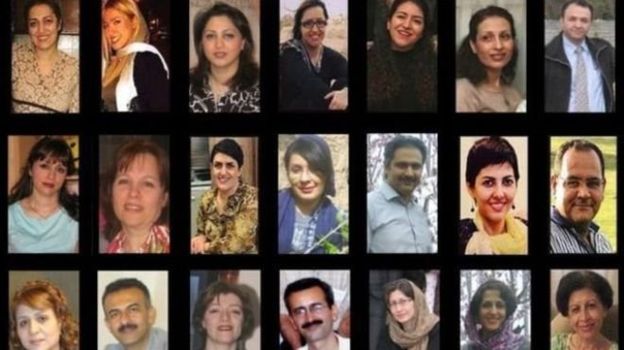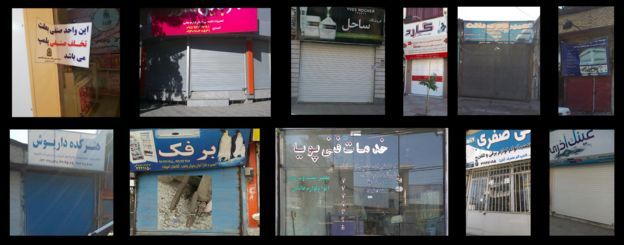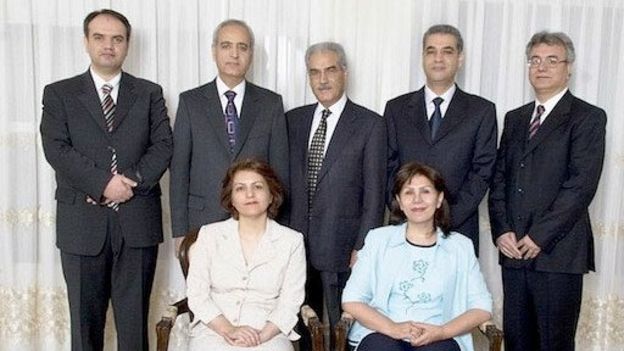Source: www.bbc.com
By Mohammad Heydari
Translation by Iran Press Watch
The “Baha’i problem” in Iran is one of the central predicaments for us. Baha’is are “the true Other ” to majority Shi’ites; how we deal with them is to examine the merits of our society, through the transition from tyranny and oppression and out of darkness. In Iran, we face discrimination, injustice, and various atrocities, but there is something distinctive about the “plight of Baha’is” that is related to our “modality of encountering others”.
On the one hand, we have been silent in the face of the injustices Baha’is have faced. On the other, we do not express the solidarity and compassion we need to have with this oppressed group. Silence and collective consensus turn suppression of Baha’is in Iran into “collective guilt”. A similar situation does not exist for any other oppression. That is why we need an alternative way to confront this problem. It is also one of the complexities of our society that must be dealt with.

Babis, Azalis and Baha’is are those Shi’ites who left Islam in its Shi’ite definition and became believers in separate religions. There are no signs of Babis or Azalis any more, but Baha’is are still a large group. According to the ruling of religious scholars, “exit from Islam” leads to apostasy. Oppression against Baha’is and silence in the face of this oppression is rooted in this inward religious approach. Though Baha’is today, unlike their predecessors, are not Muslims and have not “exited” Islam, the same anger and rancor is expressed toward them. In the religion of the ruling majority, leaving their faith deserves punishment, and our society accepts it.
The Shi’ite majority in Iran considers the Baha’i minority to be frightening, mysterious and unknown, and their religion to be false. Hence, the true “Other” for the Shi’ite majority has been Baha’is. Therefore examining the tolerance of the majority should not be measured against other minorities, but against Baha’is.
Suppression of Baha’is in Iran is ongoing repression: vast, boundless, and epidemic. It is ongoing because it has never stopped, not only in the decades after the revolution in 1979, but even before that: it has remained stable for the past hundred and fifty years. It is widespread, as it is applied across the country; from a small village in Mazandaran it has captured the big cities and the capital of Iran. It is boundless, as it includes discrimination, exclusion, displacement, exile, imprisonment, torture and murder. It is all-consuming, because this repression, regardless of Baha’i activities, covers them all. In fact, their crime is to be Baha’is – nothing else.
Sometimes there is news published about the destruction or seizure of their homes, their businesses, their farms, and their property. Sometimes news arrives that hundreds of young people have been prevented from studying at universities because they identify themselves as Baha’is. If they establish an open university, it is shut down and its founders are incarcerated. Even if they start a painting class, it is closed and the teacher is sent to prison. Sometimes news arrives that someone’s life has been taken because of their belief in the Baha’i Faith, and the killers are still free. Sometimes they do not permit burial of a Baha’i in the cemetery. Sometimes even their cemeteries are destroyed.
Insulting Baha’i beliefs and ignoring believers’ human dignity is very common: all their holy and historical places have been destroyed. Any news that arrives is about burning, tearing, killing, destroying and incarceration. The oppression has gone beyond all bounds, and the stories sound like the story of oppression by occupiers.

Consider the news in the last few months. If only part of it had happened to another minority, would it not have stirred up protests, and the anger and empathy of our society? First Farhang Amiri, a Baha’i residing in Yazd, was killed by multiple knife blows by two men in front of his home. The motive for the murder was announced as religious hatred. After that a long prison sentence was issued for a group of Baha’is in Golestan province on charges of “collaborating with enemy states” and “publicity of the Baha’i Faith”. Then the news arrived about the sealing of dozens of Baha’i-owned shops because the owners closed their stores to observe their religious holidays. After that news of the arrests of Baha’is in various cities, including Shiraz, was released. All these people’s crimes are “to be a Baha’i”; other charges – whatever they may be – are made on the same basis. But this news is left unheard and ignored.
But what makes the plight of the Baha’is one of our central issues is not the volume of unprecedented cruelty, but the way we deal with it. Our silence on the one hand, and our lack of empathy and compassion on the other, has turned the Baha’i problem into the darkest reality of our society; as long as we do not deal with this problem in a different way, the darkness will continue to deepen. The way we encounter this issue today may be called the embodiment of “silence and alienation”.
Silence means that making remarks and expressing discontent about the oppression against Baha’is is in the impermissible zone, and it will be ignored. Silence does not mean that there is no news published, but it says that the publication of the report will not stir up a public outcry, and the problem does not become our issue as a society. Whatever it is, it is only among Baha’is themselves. They publish the news, they both protest and appeal, but they do not see a broad range of non-Baha’i camaraderie.
On the other hand, in the face of these cruelties, community, empathy and cohesion do not exist. Our society not only ignores these injustices, but it does not express compassion toward them either. The price of objection to these atrocities is not only in political and security costs, but everyone knows that every empathetic word has a price among the people. In other cruelties, protests and outcries, the more progressive societal groups follow up, and empathy can be seen within the community. With the injustice that is done to laborers, the quarrels are heard, and compassion, empathy, and anger exist. With respect to discrimination against women, there is no silence among intellectuals, and no indifference in society. The prevailing mood is the same about discrimination against ethnic minorities, Sufis or Sunnis, or discrimination against the lower classes, etc. But the plight of Baha’is is of another form.

We do not recall that in recent years, and even in the last century, the endless oppression against Baha’is caused a significant response of empathy and solidarity in society. Of course, there have been objections or personal sympathy, but we have not seen a big wave. Those who ought to protest have been silent, and those who should be angry have turned their faces. Our society has become accustomed to a kind of apathy and neglect about this oppression; unfortunately, it seems as though the cause of this behavior is that we have accepted at least some validity to these tyrannical actions. Apparently, Iranians are not concerned about repression of their “true Other“, and are not sensitive to it.
In this sense, we should consider the Baha’i problem to be one of the cores of the major crisis in which we are now. Religious tyranny gains life from the dark wells of silence and consent in response to violations of the rights of others, and a series of a wide range of discrimination. Here, Muslims are considered to be superior to other believers, and Shi’a Muslims superior to other Muslims. Among Shi’ites, the Imamiyah Shi’ite receives preference to other sects, and among Imamiyah Shi’ites those who believe in the “Guardianship of the Islamic Jurist” are above all. Among the supporters of the Guardianship of the Islamic Jurist, those who are highly devoted to the Guardianship and melt within it are the purest. Tens of other discriminations are dormant within these arrangements: discrimination against ethnic minorities, women, LGBT people, unofficial religions, Sufism and Sufis, secular dissidents, atheists, political opponents, etc.
But the problem of Baha’is continues to be one of the central cores of this crisis, because tyranny against them is ongoing, broad, boundless and epidemic, and the community has remained silent and consented to it. There is no way out of the darkness of religious tyranny other than to abandon the tools of darkness. Recognition of the right to freedom of ideas, beliefs and different religions on the one hand, and promulgation of solidarity with the believers of these ideas on the other, is the inevitable step for us.
The Baha’i problem is a historical measure to exhibit the community’s readiness to withdraw from the domination of injustice. With this issue, we should determine a position. A community pride in the tolerance test is when its minorities are free – and regarding this minority, more distant and more foreign from the majority, a commitment to tolerance toward it would be that much more powerful. The consequence of public indifference to the darkness is the continuity of darkness. From within irrationality we cannot expect the rise of a wise community.
Oppression against the Other who has different beliefs or religion is the last absurdity; our method of encounter, which has been accompanied by “silence and insensitivity”, means validating the irrationality of the community. The Baha’i problem is one of our central issues because their repression is backed by great social satisfaction. Our reward for this consent is that we sink ever farther into the darkness.
One who is worried about this irrationality has no choice but to break the ban and silence, and to declare solidarity.
November 30, 2016 9:17 pm
A well-thought-out and articulate article. What seems most astonishing is that the ‘moving-force’ behind the persecution of Baha’is, is the clergy, who profess to represent the holy religion of Mohammad, (pbuh) Who explicitly taught that there should be “no compulsion in religion”. Such clergy are not legitimate representative of Mohammad’s Islam.
December 3, 2016 12:31 pm
We members of the Baha’i Faith around the world know the long and violent history of religious anger against the Faith in Iran from it’s earliest days in the 1840’s to the present. As one individual Baha’i, what strikes me is that, apart from deciding whether Baha’u’llah is true or false in a religious sense, citizens of Iran should be able to ask if they can co-exist with the followers of Baha’u’llah, in a civic sense. The answer should be a resounding, “yes”. These Baha’i citizens have always made stunning contributions to the lives of their fellow countrymen, the most obvious, present-day gift being the world renowned Azadi Tower by Baha’i architect, Hossein Amanat, and designed to evoke the swirling skirts of a Sassanid king, an honor to the great history of the Iranian people. Asking if the Baha’i Faith is good or bad for Iran is not the same as having to decide if it is true of false. On the other hand, asking if the anger and repression of the Baha’i Faith is good or bad, it is possible to determine quickly if the reasons for it are true of false. The chief claim is obviously false, that the Baha’i Faith plots with foreign governments to undermine Iran. For a 170 years Bahai’s have been under the most intrusive, examining eye of Iran’s kings and courts and clerics and now they are daily under the excruciating eye of Revolution and it’s police and its Revolutionary Guards, and in all this time, never has any shred of justification been found this accusation. Had any trace been found, all Baha’is would have been instantly killed and every evidence of these bad Baha’is would have disappeared, like many hundreds of mischievous political schemes that have cropped up and then vanished like foam on the sea. Then if this reason for being angry toward the Baha’is is false, so too is the unrelenting and systematic repression against them based on a false claim, and when has establishing a practice based on obvious falsehood ever strengthened a government or it’s people? Never. It is like when a corrupt builder lays rotten iron and then pours cement over it while smiling and saying, this building has no flaws. Meanwhile, the citizens can see the rust seeping through as the cracks begin to appear. No they pretend not to notice, go along with the builder and continue putting brick after brick on a rotten foundation? Living daily with falsehood puts a knot in the stomach and disables clear thinking. On the other hand, it is clear Baha’is are honorable Iranian citizens and have always been so over their long history, even under the greatest repression a people can face. When sympathetic teachers who don’t want to expel their Baha’i students ask the Baha’i only to tell a little lie, and just not admit that they are Baha’i when asked, the honorable students say they must be truthful, because that is what their religion requires and accept expulsion rather than lie. When the courts tell a Baha’i to come to prison to serve a sentence, the Baha’i honorably obeys, because Baha’u’llah says his followers must be obedient to their government. What more genuine demonstration of good citizenship do the people of Iran need to see that Baha’is are good and noble and people, people anyone, anywhere, would want as a neighbor? So the question is not if the Baha’i Faith is true, but the question is, if the members of the Baha’i Faith are good for Iran. History and experience says, “yes”. And to the question, is the repression of Baha’i, with it’s inherent false claim as its foundation ,good for the people of Iran, history and experience says, “no”. Honor and truthfulness are good for Iran, and regardless of whether the Baha’i Faith is true or false, the followers of the Baha’i Faith have always proved themselves to be honorable and truthful.